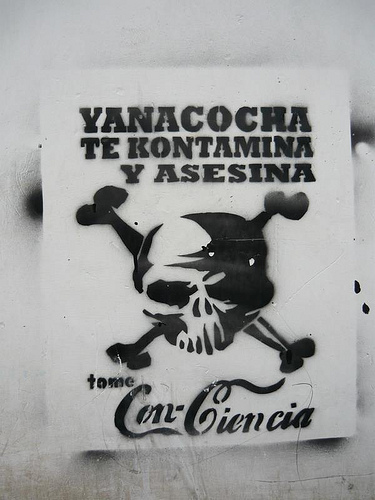Like other types of crime, slavery has changed over time [GALLO/GETTY]
Outside Allahabad, in Uttar Pradesh, India is a centre where child slaves are brought after they have been freed.
Here I met Raj. Kidnapped at the age of six, he was enslaved to make carpets that are sold in the US and Europe.
Locked
in a hut with a carpet loom, he was fed little, beaten often and paid
nothing. The man who ran the looms exercised total violent control over
the children he had enslaved. Raj's slavery lasted for five years.
Bending
over the loom, his spine curved. Breathing fine wool dust, his lungs
clogged. In the dark shed, his eyes failed. The rescue workers freed a
stunted, sick, confused and frightened little boy. Every part of Raj -
his body, mind and spirit - needed immediate help.
He is not unique, he is one of thousands of children in the same situation. Raj is just one of the lucky few who are rescued.
An old industry in new formsSlavery
has been with us for thousands of years. It has been present in most
cultures at one time or another, taking slightly different forms. Like
other types of crime it has changed over the centuries, but for many
people slavery means what happened in the 19th century. The public often
believes slavery ended with the campaigns that brought an end to legal
slavery. But nothing could be further from the truth.
Slavery
means controlling someone completely using violence, paying them nothing
and exploiting them economically. By this measure there are 27 million
slaves in the world. Many are kept in a new form of slavery that has
emerged since 1945. This slavery is different in one crucial way: Slaves
are cheaper today than at any time in human history. Slaves were major
capital purchases in the 19th century, today they are so cheap they are
disposable. How has this come about?
Three things have pushed
slavery through this rapid change. Firstly, the world's population has
tripled since 1945, with the bulk of this growth being in the developing
world. Secondly, the economic changes of globalisation, combined with
war or environmental destruction, have driven people in the developing
world both into cities and into desperation.
These impoverished
and vulnerable people are a bumper crop of potential slaves. But to turn
the vulnerable into slaves you need government corruption. When a bribe
can make police turn a blind eye, those with the means of violence
(sometimes the police themselves) can harvest slaves.
Once harvested, these slaves are different in some ways from those of the past.
Consider
slavery in the American South in 1850. At that time, an average slave
cost about $1,000; that is about $40,000 today. For that price, clear
ownership was expected, and care was taken to protect the investment.
The profits to be made were relatively low, but a slave's value meant
slaves and masters were bound in long-term, often life-long,
relationships.
Compare that to a 14-year-old girl sold into a
working class brothel in Thailand today. Her initial purchase price
might be less than $1,000. In the brothel, she will be told she must
re-pay eight times her purchase price to gain her freedom, as well as
rent, food and medicine costs. This is one form of debt bondage slavery.
Despite having sex with 10 to 15 men a night (the normal rate), her debt will keep expanding through false accounting.
The
profit that her 'owners' make from her can be as high as 800 per cent.
Her annual turnover, the amount men pay for her, is around $75,000,
though she will not see a penny of that. Her owners will be lucky to get
three or four years of use from her since HIV is common in the
brothels. But because she was so cheap to begin with, she is easily
replaced. If she is ill or injured or just troublesome, she is
disposable.
Investing in slavery
The brothels of Thailand are just one place we find contemporary
slavery. Slaves tend to be used in simple, non-technological and
traditional work. Most work in agriculture. But slaves are also found
in: brickmaking, mining and quarrying, textiles, leather working,
prostitution, gem working and jewellery making, cloth and carpet making,
working as domestic servants, clearing forests, making charcoal, and
working in shops. Most of this work is aimed at local sale and
consumption, but slave-made goods filter throughout the global economy
and into our homes.
Studies have documented the slave origins of
several international products, such as carpets, cotton, shrimp and
fish, sugar, tantalum (a mineral used in mobile phones) and jewellery.
We may be using slave-made goods or investing in slavery without knowing
it. Slave-produced cocoa, for example, goes into the chocolate we buy.
Rugs made by slave children in India, Pakistan and Nepal are mainly
exported to Europe and the US.
Business has also been pressed to
deal with recent revelations about slavery among their suppliers.
Filming of slaves on cocoa plantations in the Ivory Coast led to calls
for a boycott of chocolate. The Ivory Coast produces about half of the
world's cocoa.
In a unique response, the chocolate industry
reached an agreement with anti-slavery and anti-child labour groups to
bankroll work to remove slavery from their supply chain. The resulting
international cocoa initiative is a true public-private partnership that
has moved millions of dollars into preventing child labour and slave
labour in West Africa.
The good news ...
If there is good news about modern slavery, it is the strange paradox
of its existence today and the unique historical moment in which we
live. The 27 million slaves are, in fact, the smallest fraction of the
world population to ever live in slavery. The $40 billion they generate
as profits for slaveholders is tiny compared to other industries, and is
the smallest proportion of the global economy ever represented by
slavery. It is so small that no national economy, no industry, would
fail if slavery were suddenly ended; only the criminals that control
slaves would suffer.
Slavery has been pushed to the dark edges of
our global society, it stands on the edge of its own extinction; never
has there been a better time to end it once and for all. With slavery
illegal in every country and universal agreement on the human right of
freedom, the stage is set for complete eradication. This is a special
moment in history. Over the past 10 years slavery has come to an end for
thousands of people. In different places, different kinds of slavery
have been attacked and wiped out.
To fight slavery the growing
anti-slavery movement has tried many things, some have failed and some
have succeeded, but every attempt taught important lessons. In fact,
when it comes to testing the methods of liberation, proof of concept is
now complete. Today we know how to get people out of slavery. The
question is no longer: Can we get people out of slavery? The question
is: How many can be freed and how quickly? And the answer to that
question is all about the resources that can be devoted to freeing
slaves.
By any measure the cost of liberating and helping freed
slaves to rebuild their lives, is a real bargain. It is so remarkably
low because most slaves live in countries, like India, where incomes and
costs are low. If you calculate the cost of liberation for all 27
million slaves in the world it totals just under $11bn that will need to
be spent over a period of 25 to 30 years. That is a lot of money, but
in global terms it is small change. It is the cost of the bridge Hong
Kong is building across the Pearl River, or what the city of Seattle
will spend on its light-rail and monorail system.
Sadly, the sums actually spent on ending slavery, on enforcing their
own laws, by all governments range from pathetic to insulting, and are
nowhere near what is spent on other serious crimes. Which is all the
more frustrating because ending slavery saves money. Careful research on
freed communities show a rapid increase in the local economy and a
decline in costly environmental destruction and political corruption.
There is a clear freedom dividend when slavery ends, liberation soon
pays for itself.
We stand at a moment in human history when our
economies, governments, understanding, moral beliefs and our hearts are
aligned in a constellation that can bring slavery to an end. Our work is
limited only by our imaginations, and guided by our common dream, we
will achieve a world without slavery.
Kevin Bales is the president of Free the Slaves,
the US sister organisation of Anti-Slavery International, and a
professor of sociology at Roehampton University in London. His book
Disposable People: New Slavery in the Global Economy, published in 1999,
was nominated for the Pulitzer Prize.
The views expressed in this article are the author's own and do not necessarily reflect Al Jazeera's editorial policy.












 IT
WOULD be hard to imagine a more thorough rebuke of how America’s
Securities and Exchange Commission (SEC) tries to discipline financial
firms. In a ruling issued on November 28th, New York District
Judge Jed Rakoff rejected a deal between Citigroup and the SEC settling
charges over garbage mortgage securities. He called the settlement not
just a betrayal of the public interest, but the product of an approach
“hallowed by history but not by reason”. It allowed firms to settle
allegations without ever acknowledging guilt. This not only failed
investors, but—by obscuring the truth—society.
IT
WOULD be hard to imagine a more thorough rebuke of how America’s
Securities and Exchange Commission (SEC) tries to discipline financial
firms. In a ruling issued on November 28th, New York District
Judge Jed Rakoff rejected a deal between Citigroup and the SEC settling
charges over garbage mortgage securities. He called the settlement not
just a betrayal of the public interest, but the product of an approach
“hallowed by history but not by reason”. It allowed firms to settle
allegations without ever acknowledging guilt. This not only failed
investors, but—by obscuring the truth—society. Issandr El Amrani
Issandr El Amrani


